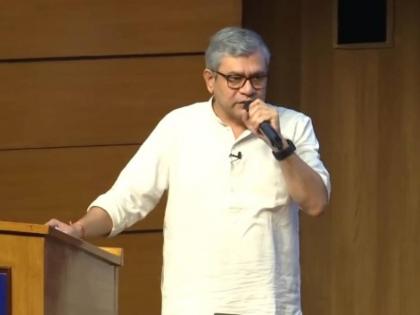Chandrayaan-4, Venus Orbiter Mission and Gaganyaan Get Union Cabinet Nod
By Lokmat English Desk | Updated: September 18, 2024 16:11 IST2024-09-18T15:45:44+5:302024-09-18T16:11:33+5:30
The Union Cabinet chaired by Prime Minister Narendra Modi on Wednesday, September 18, has approved the development of the ...

Chandrayaan-4, Venus Orbiter Mission and Gaganyaan Get Union Cabinet Nod
The Union Cabinet chaired by Prime Minister Narendra Modi on Wednesday, September 18, has approved the development of the Venus Orbiter Mission (VOM), which will be a significant step towards the Government’s vision of exploring and studying Venus, beyond moon and Mars. Venus, the closest planet to Earth and believed to have formed in conditions similar to Earth, offers a unique opportunity to understand how planetary environments can evolve very differently.
ISRO Chairman S Somanath said, "Gaganyaan programme is underway, we have also given the schedule of our first mission with astronauts. Now, we have added the goal regarding Bharatiya Antariksh Station to this mission. Initially, this mission (Ganganyaan) had only one target, but now, it has five missions, so we have broadened the scope of it."
"Chandrayaaan 4 mission is primarily targeted to demonstrate the technology to go to the moon and then come back. The coming back is a highlight of it, landing there has already been demonstrated by Chandrayaan-3. If you have to send a man to space later in 2040, a vision by our PM, we need to have confidence in technology... For the Indian Space Station, yes, there is a timeline for that - the goal given by the Prime Minister is 2035. Our plan here is to launch the first module of Bharatiya Antariksh Station called BAS-1 by 2028," ISRO chief said.
Union Minister Ashwini Vaishnaw said, "Chandrayaan-4 mission has been expanded to add more elements. The next step is to get the manned mission to the Moon. All preparatory steps towards this have been approved. Venus Orbiter Mission, Gaganyaan follow-on and Bharatiya Antariksh Station and Next Generation Launch Vehicle development also given approval."
#WATCH | On Cabinet decisions, Union Minister Ashwini Vaishnaw says, "Chandrayaan-4 mission has been expanded to add more elements. The next step is to get the manned mission to the Moon. All preparatory steps towards this have been approved. Venus Orbiter Mission, Gaganyaan… pic.twitter.com/ypGFUnW8HS
— ANI (@ANI) September 18, 2024
The ‘Venus Orbiter Mission’ to be accomplished by the Department of Space is envisaged to orbit a scientific spacecraft in the orbit of planet Venus for a better understanding of the Venusian surface and subsurface, atmospheric processes and the influence of the Sun on the Venusian atmosphere. The study of the underlying causes of the transformation of Venus, which is believed to be once habitable and quite similar to Earth, would be an invaluable aid in understanding the evolution of the sister planets, both Venus and Earth.
"The cabinet of NDA govt under PM Modi has approved one after another scheme to benefit farmers. Today, a subsidy of Rs 24,475 crore for NPK fertilizers has been allocated. The disruption that is going on in the supply chain and global prices all over the world - and by keeping in mind the conflicts in the Middle East and Russia-Ukraine, to keep our farmers unaffected by all these, in Cabinet today this decision has been taken to allocate nutrient based subsidies," Ashwini Vaishnaw said.
➣ #Cabinet approves mission to moon, named #Chandrayaan4 to develop and demonstrate the technologies to come back to Earth after successfully landing on the Moon and also collect moon samples and analyse them on Earth#Chandrayaan3 was a big success and based on that the next… pic.twitter.com/m0bVHiwENs
— PIB India (@PIB_India) September 18, 2024
"Chandrayaan-4 mission has been expanded to add more elements. The next step is to get the manned mission to the Moon. All preparatory steps towards this have been approved. Venus Orbiter Mission, Gaganyaan follow-on and Bharatiya Antariksh Station and Next Generation Launch Vehicle development also given approval," added Minister Ashwini Vaishnaw.
ISRO will be responsible for the development of the spacecraft and its launch. The Project will be effectively managed and monitored through the established practices prevailing at ISRO. The data generated from the mission would be disseminated to the scientific community through existing mechanisms.
Union Cabinet has approved mission to Venus-Venus Orbiter Mission (VOM)-for scientific exploration and for better understanding of Venusian atmosphere, geology and generate large amount of science data probing into its thick atmosphere. https://t.co/evg9hWFWpz
— ANI (@ANI) September 18, 2024
The mission is expected to be accomplished on the opportunity available during March 2028. The Indian Venus mission is expected to answer some of the outstanding scientific questions, resulting in various scientific outcomes. The realization of the spacecraft and launch vehicle is through various industries and it is envisaged that there would be large employment potential and technology spin-off to other sectors of the economy.
The total fund approved for the Venus Orbiter Mission” (VOM), is Rs.1236 Cr out of which Rs 824.00 Crore will be spent on the spacecraft. The cost includes development and realization of the spacecraft including its specific payloads and technology elements, global ground station support cost for navigation and network as well as the cost of launch vehicle.
Journey towards Venus
The mission would enable India for future planetary missions with larger payloads and optimal orbit insertion approaches. There would be a significant involvement of Indian Industry during the development of the spacecraft and launch vehicle. The involvement of various academic institutions and training to students in a pre-launch phase that includes design, development, testing, test data reduction, calibration, etc., is also envisaged. The mission, through its unique instruments, offers the Indian Science community new and valuable science data and thereby providing emerging and novel opportunities
Open in app